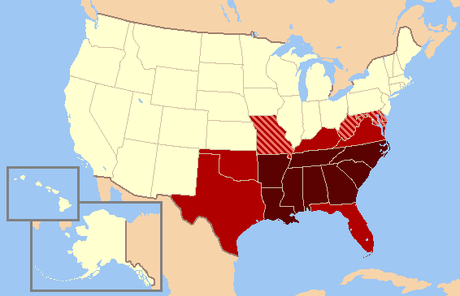 (This image of "The South" is from Wikipedia.)
(This image of "The South" is from Wikipedia.)I was born and raised, and still live in the "South" -- in Texas, a very red state where beliefs and voting habits mirror the other Southern Staes. But I think this is a valid question -- Is the South dragons America down, and keeping it from fulfilling the American Dream? I certainly think a case can be made for that, as the Republican-dominated South seems to be against any progress toward equality or other human rights. Here is how Michael Lind answers the question in an article for Politico:
Every year the Fourth of July is marked by ringing affirmations of American exceptionalism. We are a special nation, uniquely founded on high ideals like freedom and equality. In practice, however, much of what sets the United States apart from other countries today is actually Southern exceptionalism. The United States would be much less exceptional in general, and in particular more like other English-speaking democracies such as Britain, Canada, Australia and New Zealand were it not for the effects on U.S. politics and culture of the American South. I don’t mean this in a good way. A lot of the traits that make the United States exceptional these days are undesirable, like higher violence and less social mobility. Many of these differences can be attributed largely to the South. All English-speaking democracies share certain characteristics in common. Compared to continental European and East Asian democracies, the Anglophone nations tend to be more market-oriented and less statist, with somewhat lower levels of social spending and weaker bureaucracies. We might even speak of “Anglosphere exceptionalism.” But even by the standards of the English-speaking world, the U.S. appears as an extreme outlier, in areas ranging from religiosity to violence to anti-government attitudes. As we learned after the slaughter last month in Charleston, S.C., some deluded Southerners still pine for secession from the Union. Yet no doubt there are also more than a few liberal Northerners who would be happy to see them go. Minus the South, the rest of the U.S. probably would be more like Canada or Australia or Britain or New Zealand—more secular, more socially liberal, more moderate in the tone of its politics and somewhat more generous in social policy. And it would not be as centralized as France or as social democratic as Sweden. As a fifth-generation Texan, and a descendant of Southerners back to the 1600s, I don’t want to encourage lurid stereotypes of a monolithic South. The states of the former Confederacy include ethnic minorities like Louisiana Cajuns and Texas Germans, along with African Americans. And the dominant conservatives in the South have always been challenged from within the ranks of the white community by populists, liberals and radicals. But the South really is different from the rest of the country. Here are some examples of how the South skews American statistics. Today there is more inter-generational social mobility in Europe than in the United States, contrary to the American myth that the United States is still the world’s No. 1 land of opportunity. The Economic Mobility Project of Pew Charitable Trusts has shown that children are far less likely to rise above the socio-economic levels of their parents in the U.S. than are those in Britain, Canada and Australia, as well as Germany, France and the Nordic nations. The American South, with the lowest rates of intergenerational social mobility in the U.S., clearly skews the national statistics, creating an embarrassing and depressing version of American exceptionalism. Economic inequality? Apart from California and New York, where statistics reflect the wealth of Wall Street, Hollywood and Silicon Valley, the South is the region with the greatest income inequality. Southern exceptionalism has helped to ensure that the American Dream is more likely to be realized in the Old World than in the New. The mythology of American exceptionalism holds that ever since 1776 the United States has led the rest of the world in expanding individual liberty and the growth of the middle class. This makes for inspiring Fourth of July rhetoric, but it has never been true. In reality, the United States has frequently lagged behind Britain and her other offspring in these areas. Britain peacefully abolished slavery within its empire in the 1830s; thanks to Southern opposition, the U.S. did so only as the result of the catastrophic Civil War. And thanks to mid-century Southern members of Congress, welfare-state policies from home ownership to Social Security were designed to reinforce segregation or exclude the disproportionately-Southern black and white poor. Not until the 1960s, with the help of federal military intervention in Southern states, was the right of African-Americans to vote secured. And today white Southern Republicans are at the forefront of efforts to roll back the voting rights revolution by making voter registration more difficult.

